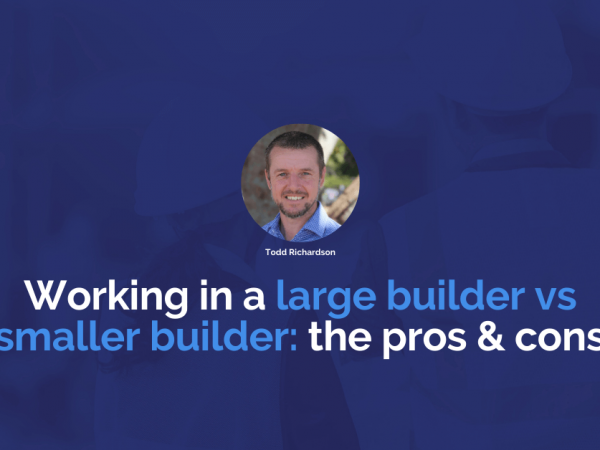Understanding the pros and cons of working in each of the different tiered builders is crucial when choosing an employer.
What works for some won’t work for others. And while some people thrive in places like a large corporate environment, others don’t.
That’s why, when we work with job seekers, we always advise that they understand what they want in terms of project size, type and organisational culture and then find an employer that suits them.
So here’s some insight into the pros and cons of working in the different tiered builders. I’ve broken this topic into two parts. For part 1, we’re looking at your larger builders.
Before I start, I’d like to note – there is no such thing as the right or wrong employer. It comes down to your preferences, personality type and your future and current goals. And like with anything, there are always exceptions to the rule. What I’ve outlined below is just what we see in general.
Larger Builders = Better Salaries
If you’re working in the tier 1 or upper mid tier space, you will often be paid a higher salary than you would in a smaller builder.
This is largely influenced by the variations in project size, type and responsibilities of the professionals employed in this area. This isn’t to say there isn’t the opportunity for competitive salaries in your smaller builders. But in general, the bigger the builder, the greater capacity they have to support higher wages. If money is a key driver in your employment decision, this is something you should consider.
The con: while the opportunity for higher salaries is greater in your larger builders, you will be expected to work longer days and weeks. This is due to the size and complexity of the jobs being carried out in these builders, creating more control processes and means tasks take longer to complete. Builders generally mediate this by spending longer hours on site.
Longer Project Durations
Project timelines are generally lengthier in your bigger builders. They can run anywhere from 2-5 years, due to the size and scope of works being carried out. The upside of this is that big projects will generally provide you with strong job security for that project’s duration.
The con: job security is great, but working on the same build day in day out can become mundane for some people. And we’ve had many dealings with candidates who prefer to see more diversity in their work. While I present this as a con, it’s entirely personality/preference driven.
More Opportunity to Gain In-Depth Experience
If you prefer to control a small part of a bigger process and gain an in-depth understanding of your role, working for a larger builder is the way to go! In this environment, your focus will generally be on a centralised set of tasks which provides a great opportunity to build expertise in your chosen area of work.
The con: you can find yourself at risk of being pigeonholed into a particular role, which can create hurdles for you down the line if you decide you want to move into something different (e.g moving from a finishes foreman to a structures foreman). It can also be challenging to progress in companies of this size (CA to PM role etc.) due to the dollar value of the projects they complete. There is a lot of perceived risk involved for a builder in letting a first-time project manager cut their teeth on a $100m + development.
More Opportunity to Develop Large Volume Stakeholder Management
If you’re looking for experience managing diverse groups of stakeholders, you will find it in your larger builders. Often, the bigger the project, the more people involved in/affected by its build. Naturally, this sector of the industry provides more opportunity for you to gain large volume stakeholder management.
The con: The more stakeholders you have to manage, the more time you need to spend managing them. I’ve discussed this with many project managers working for larger builders in the past and they’ve expressed angst about it. Stakeholder management becomes the main task in their day, and they can begin to feel removed from the construction process. And this isn’t something everyone enjoys. Again, I present this as a con, but it’s entirely personality/preference driven.
As I said earlier, there is no right or wrong employer, but there are variables to working in each. The employer size you choose to work for needs to be driven by your personality, preferences and goals.
Hopefully, this article has given you more understanding of whether a larger builder environment is right for you.
Keep an eye out for part 2, where we look at the pros and cons of working in your smaller builders.
Looking for your next construction job? Search our current construction roles here, or to chat to our team about securing your next opportunity, get in contact with us through our Contact Us page.
Receive our updates straight to your inbox



